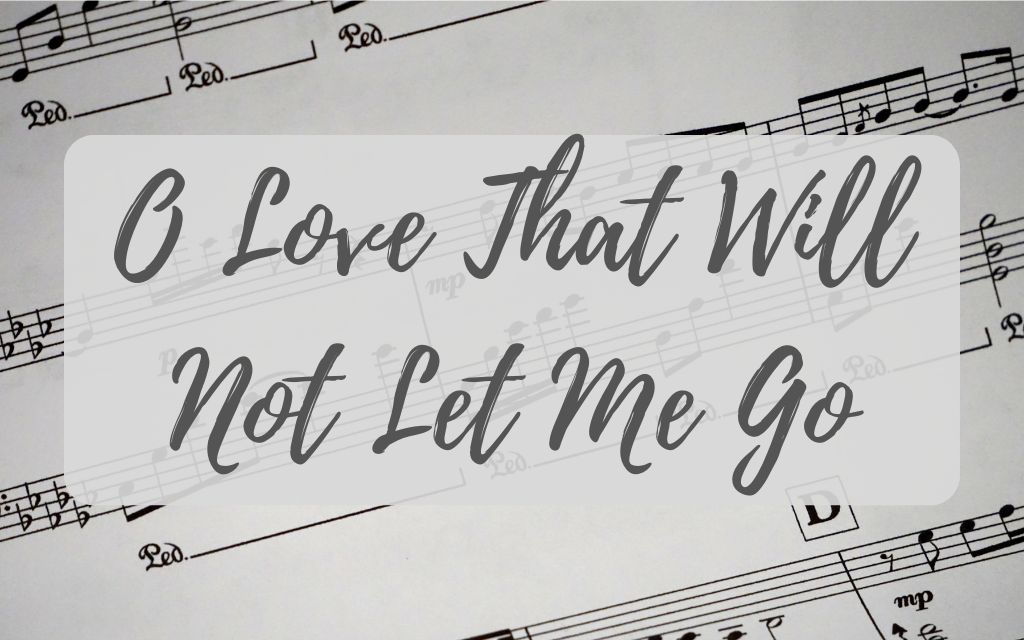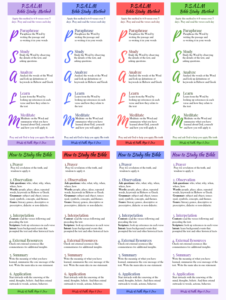When I was a brand-new Christian, I spent my first year just reading through the Bible to know the story. But it was quite shallow; I wanted to study the Word and dig in deeper. So, I did what I knew best; I turned to google for help. I got more than I asked for as I discovered many different Bible study methods.
Praise God for so many people willing to help others study His Word. The technique that interested me most was the FOCUS Bible study method. I tweaked it a little bit to make it more suitable and then tweaked it some more after learning hermeneutics.
I thought it would be fun also to create an acronym for my Bible study method and share it. After lots of thinking and praying, I introduce to you the PSALM Bible study method!
The PSALM method is an easy and effective way to study the Bible inductively. With this method, you will learn to meditate, love, and treasure the Word like the psalmists.
Oh how I love your law! It is my meditation all the day. Your commandment makes me wiser than my enemies, for it is ever with me. I have more understanding than all my teachers, for your testimonies are my meditation.
Psalm 119:97-99
Before you learn the PSALM method below, make sure to read my previous post: How to Study the Bible. I gave more in-depth details about the different elements of an exegetical Bible study as well as basic principles of biblical hermeneutics.
If you are all caught up, here is the PSALM Bible study method.
The PSALM Bible Study Method
The PSALM Bible study method is a method in which you take a portion of Scripture – about 6-8 verses and study it for five days. Each letter of the acronym PSALM stands for a different way to engage the text each day.
Studying the Bible this way because makes you take your time with God’s Word, meditate on it longer, and dig deeper than you would while exploring a different passage every day.
Before the study
Before you begin, chose a passage you will study. I recommend studying one book of the Bible at a time to avoid contextual errors. Once you have selected a book, learn the ABC’s of the book: author & audience, background, and culture (and context if not going through a book). You can find all that in a Study Bible or through these free online resources:
- Read Scripture Videos at The Bible Project
- Bible Survey at Got Questions
- Bible Introductions at Grace to You
- NIV Study Bible at Biblica
- Overview of the Books of the Bible at Reformed Answers
After learning the historical facts of the book, you can dive into the text. Spend the first week reading the entire book several times in multiple translations. If it’s a small book, try to read it in one sitting. Then write an outline of the book and dissect it into sections for a more in-depth study using the following steps.
Note that every step should be preceded by praying and reading the selected Scripture each day.
P – Paraphrase the Word
On the first day, get more acquainted with the passage by writing and paraphrasing it verse by verse. Writing Scripture will make you focus on it and think about it. While paraphrasing will help you understand what the text is saying in your own words.
S – Study the Word
Study the text by making observations and asking questions; make sure to write them down. It helps to look at different translations for comparison during your study. I use the You Version Bible App to compare translations. I also highlight the Bible using this color system to observe different themes in the text. If you don’t want to write in your Bible, you can print out the passage and write on it. I use a journaling Bible for Bible study in which I write and highlight liberally.
A – Analyze the Word
Next, analyze the words of the text. Take notes of repeated words, contrasting words, keywords, etc. You can square repeated words and circle contrasting words using different pen colors. Select some keywords and look up their definitions in Hebrew or Greek. Start with words that appear repeatedly, and words that are different in other translations. I use the Interlinear Bible on Bible hub, Blue Letter Bible, and Step Bible (Hebrew) to do my word studies.
L – Learn from the Word
Here you use cross-references to learn what the Scripture has to say about the passage you are studying. Check verses that come to your mind while reading the text, and use external resources like a Study Bible, Reference Bible, Blue Letter Bible, Bible Study Tools, and Treasury of Scripture Knowledge ( I love this one!) Go through your selected passage verse by verse and write down how each cross-reference relates to it. I also like to write out all the references word-by-word.
Afterward, look back to your questions to check if you can answer them from what you have learned so far. If you get stuck, you can learn from others by using commentaries or other external resources.
M – Meditate on the Word
On the last day, read your notes and meditate on what you have learned from the text. Then journal your thoughts in three sections:
What have you learned?
This part is essentially your interpretation of the passage. Summarize the core message of the text, what you have learned about God, and, the main idea of the text.
What do you think?
Here you summarize how the Bible read you. What you have learned about yourself, things that surprised you, things you wrestle with, etc.
What will you do?
Lastly, align your beliefs with the truth you have learned, and decide how you will apply it. Try to come with one action or change you will implement as a result.
Close in prayer. Thank God for His Word and ask Him to help you put in practice what you have learned so you may be a doer of the Word (James 1:25).
When I am done with my study, I listen to a sermon about the passage I just studied for more insights. My go-to place is Grace to You by John MacArthur. John MacArthur is a renowned doctrinally sound preacher who has preached on every verse of every book of the NT. If you are studying an NT book, you can find an expository sermon about it on GTY.
Voila!
I hope this method will help you to study and enjoy God’s Word. Or help you devise a study routine that works better for you. It takes longer to study the Bible this way (I have been studying the book of 1 John for 3.5 months), but what’s the rush? Furthermore, this Bible study method makes scripture memorization easier, but more on that in another post.
I created these bookmarks with the PSALM Bible study method, as well as the principles of biblical hermeneutics from my previous post: “How to Study the Bible.” You can grab them for free in my digital library when you subscribe to the blog.











[…] PSALM […]
All we want to know is how to use the reference Psalm 18 (19): 2-5 so as we can begin to understand the written words Not paragraphs of words which could be taken up by just knowing the above ref in the same way I would learn where to go from one place to another when using a map
Hi Terry, I am sorry I don’t quite understand your comment.
[…] method purely by accident while I was researching another method. It was developed by Carey over at Words of Faith, Hope and Love. To use this method, you will need to have an understanding of the history and context of biblical […]
[…] method purely by accident while I was researching another method. It was developed by Carey over at Words of Faith, Hope and Love. To use this method, you will need to have an understanding of the history and context of biblical […]
Oh, I see what you mean now. Yeah, that definitely does clear things up. Thanks for taking the time to talk with me and for helping me to understand your point of view because I really was interested in knowing. Like I said, I didn’t want to second guess you. It also made for a very pleasant conversation. It’s been nice making your acquaintance, and I look forward to meeting you and Alyson and all of our brothers and sisters in heaven someday. Until then, be well and stay safe. Always. 😊 Sandy P.S. Thanks to you as well, Alyson,… Read more »
Thank you for seeking clarification and not jump to conclusions. It is a rare and admirable trait these days! It was also nice meeting you!
Hey!
Thanks so much for your kind words. I really appreciate it and I really enjoyed the conversation. Maybe we can do it again sometime.
Be well, stay safe, and have a great weekend! 😊
Hi there! How are you today?
When you say, “bowing to the antichrist and take the mark, and then repent are slim”.
What do you mean exactly? Can you expand on that please? My understanding is a little fuzzy here and I don’t want to second guess you.
Thanks and have a great week!
Hey Sandy. It’s nothing serious. When I first heard the question, my immediate thoughts were that if someone decides to worship the antichrist and take his mark, his heart would probably be too hardened to repent. I am not saying it’s impossible (to repent after taking the mark), I just think the chances are slim (but I could be wrong). And if someone genuinely repents after taking the mark, I also cannot say with certitude God will reject him.
I hope it clears things up!
Hi Alyson,
How do I read the rest of this person’s reply from yesterday, June 3rd regarding my question about the mark of the beast? I can see my first two replies and the poster’s responses, but I cannot see this person’s latest response. Everything is pushed off to the side on the right.
Could you respond and leave an answer in my email please? Thanks so much. I appreciate it.
Sandy
I cannot believe just how many Bible study methods there are out there! Pretty neat.
With regards to John MacArthur, who I have respected for a very long time, there’s something I don’t understand. There are people on YouTube who have said that John MacArthur teaches that a person can take the mark of the beast and still be saved?
How can this be true when Revelation 14 speaks of all the horrible consequences that will come upon anyone who does that?
Someone asked John MacArthur in a QA if a person could take the mark of the beast and still be saved, and he said yes mainly because the Bible says the only unforgiving sin is blasphemy of the Holy Spirit. And because Revelation says if we worship the idol and take his mark. He explained his reasoning in this blog post I think people blew his comment way out of proportion. He gave his explanation based on Scripture, and a lot of things are not clear when it comes to end-time events. I wouldn’t worry about it, John MacArthur is… Read more »
Hi.
In my opinion, there will be no excuse for taking the mark of the beast. To do that, is to reject God and align oneself with Satan, but I do appreciate your taking the time to reply to my comment regarding John MacArthur. Thank you.
Be well and stay safe.
Hi!
I forgot to thank you for the link you included in your response. Thanks. I appreciate your doing that. I’ll give it a read sometime.
Everyone, be well and stay safe.
My pleasure! Stay safe 🙂
That’s fine, I don’t agree with him either. I just think his arguments are well reasoned and people shouldn’t call him a heretic because of that. It is such an unlikely scenario anyway.
Hi! Thanks for your response. I’m curious though…..
When you say, “It is such an unlikely scenario anyway”, what do you mean exactly so I understand?
Thanks!
Oh, I just think the likelihood of anyone bowing to the antichrist and take his mark, and then repent are slim.
[…] PSALM – Paraphrase, Study, Analyze, Learn, Meditate […]
This is a great Bible study acronym, Carey! I have added it to my A-Z list!
Awesome! Thanks!
I definitely think asking the Lord to use His Word to speak to you is important. I like to breathe a prayer before I read asking Him to show me what I need and to speak to me. I write something I have learned or whatever stood out to me in a journal afterwards. I just finished Ezekiel and that was a hard one! Haha! Then I ask the Lord to continue using His Word in my life throughout the day. Thank you for sharing this method!